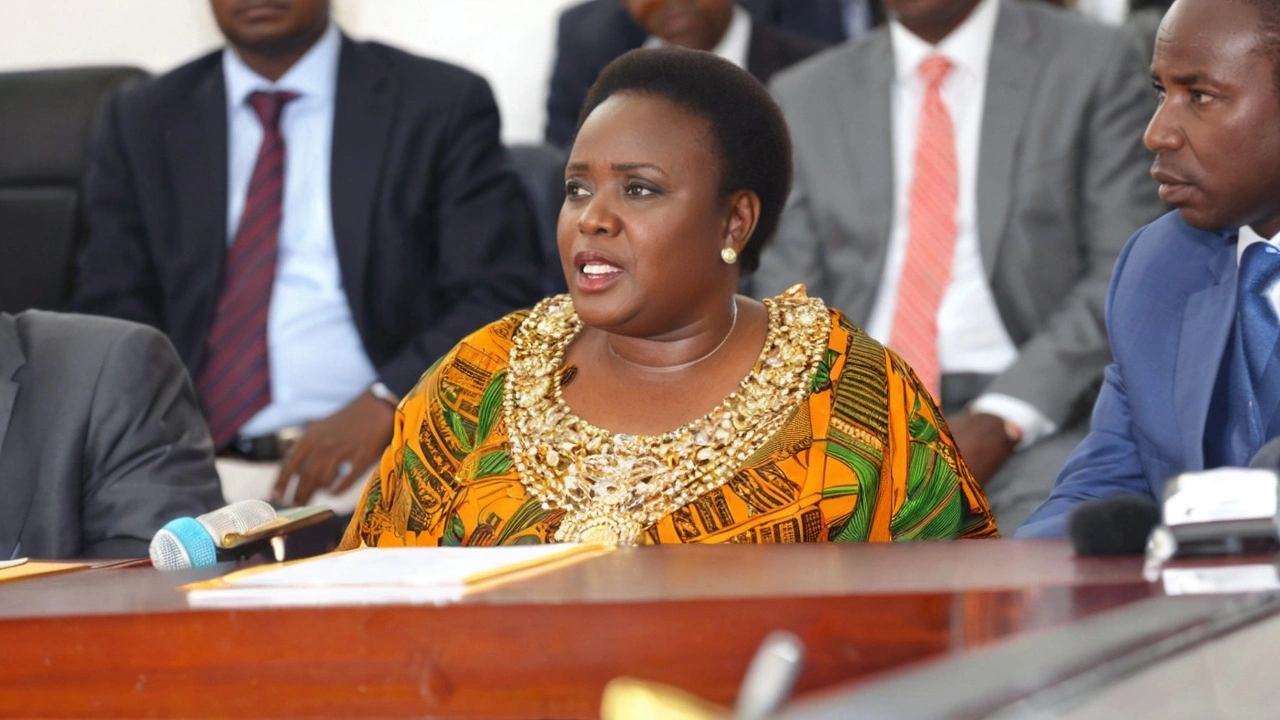The political landscape of Meru County has once again been shaken as Governor Kawira Mwangaza faces her second impeachment by the Meru County Assembly. The motion was tabled by MCA Peter Mwiti and garnered overwhelming support from the assembly, with 67 out of 69 MCAs present voting in favor of the motion. This development marks another chapter in the tumultuous tenure of Governor Mwangaza, who had previously been impeached in December 2023 and subsequently reinstated by the Senate in January 2024 after a successful appeal.
The grounds for Mwangaza's impeachment are severe, including allegations of gross misconduct, misuse of public funds, and undermining the authority of the county assembly. These accusations have sparked heated debates within the assembly and among the public, leading to a highly charged political atmosphere. During the session, emotional arguments were made both for and against the impeachment motion, with Mwangaza's supporters vehemently defending her administration and disputing the accusations.
Key Allegations and Implications
The allegations of gross misconduct center around claims of improprieties in the Governor's executive decisions and behavior in office. This includes purportedly making unilateral decisions without consulting the assembly and allegedly engaging in actions that contravene the ethical expectations of her position. Such accusations have stoked anger and dismay among the MCAs who voted for her impeachment, believing that her conduct jeopardizes the integrity of the county's leadership.
Misuse of Public Funds
The issue of financial mismanagement has also played a central role in the impeachment motion. Specifically, critics allege that Governor Mwangaza has misused public funds allocated to various county projects, directing them for personal or unauthorized uses. The specifics of these financial improprieties have not been fully disclosed, but the allegations have been enough to sway a significant majority of the assembly members to support her impeachment. If proven true, these allegations could have severe legal and professional consequences for Mwangaza, casting a long shadow over her political career.
Undermining County Assembly Authority
Another focal point of the impeachment charges is the Governor's alleged undermining of the county assembly's authority. This primarily revolves around claims that Mwangaza has bypassed the assembly in key decision-making processes, disregarding the procedural norms that uphold the checks and balances within the county's governance structure. Proponents of the impeachment argue that such actions have not only weakened the county assembly's role but have also eroded public trust in the democratic processes at the county level.
The Impeachment Session and Reactions
The impeachment session, presided over by Speaker Kaberia Mundigi, was marked by prolonged debates and intense exchanges among the assembly members. The air was thick with tension as each side presented their arguments, reflecting the deeply polarized views on Mwangaza's governance. Supporters of the Governor urged caution, emphasizing the need for fair assessment and due process. They argued that the impeachment was politically motivated and not grounded in substantial evidence, cautioning against a rush to judgment that could further destabilize the county.
On the other hand, those in favor of the impeachment highlighted the necessity of accountability and the rule of law. They contended that Governor Mwangaza's actions warranted serious scrutiny and that the assembly had a duty to act in the best interest of the constituents. For them, the vote was a clear message that misuse of power and funds would not be tolerated, and that the assembly was prepared to take decisive action to uphold ethical governance standards.

A Step Towards Senate Deliberation
With the impeachment motion now passed by the Meru County Assembly, the next step lies with the Senate, which will deliberate on the matter and decide Mwangaza's fate. This stage of the process is expected to be just as contentious, with both sides preparing to make their case before the Senate. Mwangaza's supporters are likely to push for her reinstatement, echoing their arguments from the county assembly, while her detractors will seek to persuade the Senate to uphold the impeachment.
The Senate's decision will be closely watched, not only in Meru County but also across Kenya, as it will set a precedent for how such political disputes are resolved at the county level. The outcome will have significant implications for Mwangaza's political trajectory, either enabling her to reclaim her position or ending her tenure prematurely. Moreover, it will also impact the broader political dynamics within Meru County, potentially reshaping alliances and influencing future elections.
Political Tensions and Public Sentiment
This latest impeachment has undoubtedly heightened political tensions within Meru County. The sharp divisions among the county assembly members reflect a broader schism within the local political landscape, where loyalties and rivalries run deep. Supporters of Mwangaza have expressed their dissatisfaction with the impeachment decision, viewing it as an unjust attack on a governor who has worked to bring change to the county. Their grievances are likely to fuel further political activism and rallies, as they seek to mobilize public support and apply pressure on the Senate deliberations.
Conversely, for the MCAs and constituents who support the impeachment, this move represents a necessary step towards cleaning up local governance. They argue that holding leaders accountable is essential for maintaining trust in public institutions and ensuring that county resources are utilized effectively and transparently. The impeachment, in their view, serves as a deterrent against future misconduct and sets a standard for ethical governance.

Future Prospects and Uncertainties
As Meru County awaits the Senate's verdict, the future remains uncertain. Mwangaza’s political fate hangs in the balance, with her legacy and the immediate future of Meru's leadership under scrutiny. Regardless of the outcome, this episode underscores the complexities and challenges of county-level governance in Kenya, where political, ethical, and financial issues intertwine.
The impeachment process has also sparked broader conversations about the mechanisms of accountability and the robustness of democratic institutions at the county level. It has highlighted the need for clear guidelines and transparent processes for handling allegations of misconduct, ensuring that such matters are addressed fairly and effectively. As the situation unfolds, the people of Meru County, and indeed the entire nation, will be watching closely, eager to see how the democratic processes will prevail.

